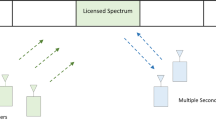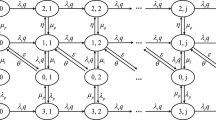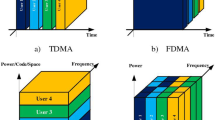Abstract
In this paper, we study a coalitional game approach to resource allocation in a multi-channel cooperative cognitive radio network with multiple primary users (PUs) and secondary users (SUs). We propose to form the grand coalition by grouping all PUs and SUs in a set, where each PU can lease its spectrum to all SUs in a time-division manner while the SUs in return assist PUs’ data transmission as relays. We use the solution concept of the core to analyze the stability of the grand coalition, and the solution concept of the Shapley value to fairly divide the payoffs among the users. Due to the convexity of the proposed game, the Shapley value is shown to be in the core. We derive the optimal strategy for the SU, i.e., transmitting its own data or serving as a relay, that maximizes the sum rate of all PUs and SUs. The payoff allocations according to the core and the Shapley value are illustrated by an example, which demonstrates the benefits of forming the grand coalition as compared with non-coalition and other coalition schemes.





Similar content being viewed by others
References
Akyildiz, I. F., Lee, W.-Y., Vuran, M. C., & Mohanty, S. (2006). Next generation/dynamic spectrum access/cognitive radio wireless networks: A survey. Elseiver Computer Networks, 50(13), 2127–2159.
Haykin, S. (2005). Cognitive radio: Brain-empowered wireless communications. IEEE Journal on Selected Areas in Communications, 23(2), 201–220.
Laneman, J., Tse, D., & Wornell, G. (2004). Cooperative diversity in wireless networks: Efficient protocols and outage behavior. IEEE Transactions on Information Theory, 50(12), 3062–3080.
Xu, H., & Li, B. (2010). Efficient resource allocation with flexible channel cooperation in OFDMA cognitive radio networks. In Proceedings of IEEE INFOCOM 2010, March 2010.
Simeone, O., Stanojev, I., Savazzi, S., Bar-Ness, Y., Spagnolini, U., & Pickholtz, R. (2008). Spectrum leasing to cooperating secondary ad hoc networks. IEEE Journal on Selected Areas in Communications, 26(1), 203–213.
Zhang, J., & Zhang, Q. (2009). Stackelberg game for utility-based cooperative cognitive radio networks. In Proceedings of ACM MobiHoc 2009, May 2009.
Han, Z., & Poor, H. V. (2009). Coalition games with cooperative transmission: A cure for the curse of boundary nodes in selfish packet-forwarding wireless networks. IEEE Transactions on Communications, 57(1), 203–213.
Aram, A., Singh, C., Sarkar, S., & Kumar, A. (2012). Cooperative profit sharing in coalition-based resource allocation in wireless networks. IEEE/ACM Transactions on Networking, 20(1), 69–83.
Saad, W., Han, Z., Debbah, M., Hjorungnes, A., & Basar, T. (2009). Coalitional game theory for communication networks: A tutorial. IEEE Signal Processing Magazine, 26(5), 77–97.
Mathur, S., Sankaranarayanan, L., & Mandayam, N. (2008). Coalitions in cooperative wireless networks. IEEE Journal on Selected Areas in Communications, 26(7), 1104–1115.
Osborne, M. & Rubinstein, A. (1999). A course in game theory. Cambridge: The MIT Press.
Li, D., Xu, Y., Wang, X., & Guizani, M. (2011). Coalitional game theoretic approach for secondary spectrum access in cooperative cognitive radio networks. IEEE Transactions on Wireless Communications, 10(3), 844–856.
Boyd, S. & Vandenberghe, L. (2004). Convex optimization. Cambridge: Cambridge University Press.
Shapley, L. S. (1971). Cores of convex games. International Journal of Game Theory, 1(1), 11– 26.
Sarkar, S., Singh, C., & Kumar, A. (2008). A coalitional game model for spectrum pooling in wireless data access networks. In Proceedings of 3rd information theory and applications workshop, January 2008.
Saad, W., Han, Z., Debbah, M., & Hjorungnes, A. (2009). A distributed coalition formation framework for fair user cooperation in wireless networks. IEEE Transactions on Wireless Communications, 8(9), 4580–4593.
Fujishige, S. (1978). Polymatroidal dependence structure of a set of random variables. Information and Control, 39(1), 55–72.
Madiman, M. (2008). Cores of cooperative games in information theory. EURASIP Journal on Wireless Communications and Networking, 2008, 1–12
Cheng, H., Yang, Q., Fu, F., & Kwak, K. S. (2011). Spectrum sharing with smooth supermodular game in cognitive radio networks. In Proceedings of 11th international symposium on communications and information technologies, October 2011.
Singh, C., & Altman, E. (2011). The wireless multicast coalition game and the non-cooperative association problem. In Proceedings of IEEE INFOCOM 2011 conference, April 2011.
Wu, Y., Wang, B., Liu, K. J. R., & Clancy, T. C. (2009). Repeated open spectrum sharing game with cheat-proof strategies. IEEE Transactions on Wireless Communications, 8(4), 1922–1933.
Wang, B., Wu, Y., Ji, Z., Liu, K. J. R., & Clancy, T. C. (2008). Game theoretical mechanism design methods: Suppressing cheating in cognitive radio networks. IEEE Signal Processing Magazine, 25(6), 74–84.
Yao, H., & Zhong, S. (2011). Towards cheat-proof cooperative relay for cognitive radio networks. In Proceedings of ACM MobiHoc 2011, May 2011.
Author information
Authors and Affiliations
Corresponding author
Rights and permissions
About this article
Cite this article
Chan, YW., Chien, FT., Chang, R.Y. et al. Spectrum sharing in multi-channel cooperative cognitive radio networks: a coalitional game approach. Wireless Netw 19, 1553–1562 (2013). https://doi.org/10.1007/s11276-013-0551-7
Published:
Issue Date:
DOI: https://doi.org/10.1007/s11276-013-0551-7




